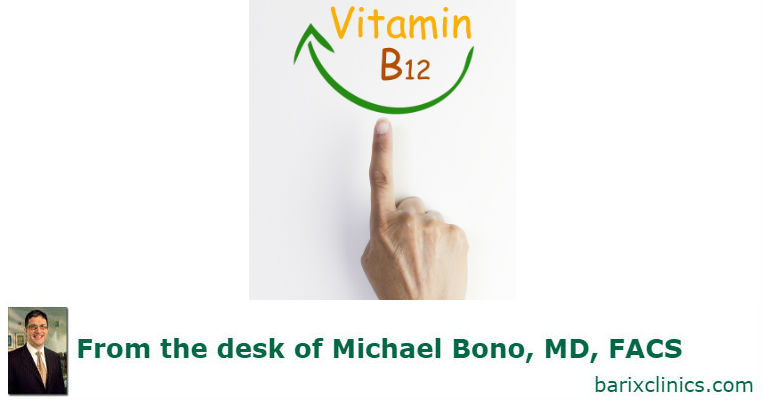B Vitamins, B12/Cyanocobalamin
I will start off the vitamin section with B Vitamin overview, and one very prominent in bariatric surgery, B12 or Cyanocobalamin.
The B Vitamins are water soluble and play important roles in cell metabolism. Unique to these vitamins, while they share similar names, they are very distinct different structures that can coexist in similar foods. Also, one will notice gaps in the numbering of B Vitamins. This is because the original list of compounds did not qualify the basic definition, being that a B Vitamin had to be a cofactor/coenzyme for a key metabolic cell process or a precursor needed to make a cofactor/coenzyme for a key metabolic cell process, and was removed.
Vitamin B12, Cyanocobalamin or Extrinsic Factor is on of the most important vitamins to consider in a bariatric patient’s diet, and has an amazing historical discovery. It is also nicknamed the “red vitamin” as it is a crystalline red compound. Anyone who has taken this as a liquid orally or by injection will correlate. It is unique also that it is the only vitamin that contains an essential mineral — cobalt.
In the 1820’s, a deadly form of anemia (decreased circulating red blood cell mass) was associated with degeneration of the stomach lining, called pernicious anemia. Pernicious means “insidious harm” or “ruin”, and it remained totally incurable until the 1920’s when two US physicians found a diet made from raw liver cured the symptoms. Numerous research efforts continued to isolated this “Extrinsic factor” which reversed some people with the anemia, which we know now to be B12 which is in high concentration in the liver. It was then found that a mucoprotein enzyme made by the parietal cells inside the stomach (the same cells that make hydrochloric acid) was also needed for B12 absorption in the intestines, and was coined “Intrinsic factor”. Pernicious anemia is defined as a disease of decreased intrinsic factor levels, seen in older patients, due to multiple causes such as genetic predisposition, autoimmune disease, bacterial overgrowth, pancreatic insufficiency and parasitic infection.
Back to B12 …B12 binds with Intrinsic factor which assists in its absorption in the ileum, the last part of the small bowel. B12 is important with protein metabolism, the formation of red blood cells, and the maintenance of the central nervous system. It can be found in a wide variety of animal proteins, such as organ meats, shell fish, meat, poultry, eggs, milk/dairy foods, and some breakfast cereals. Plant food have no B12 unless they are fortified.
The body can store B12 for years in the liver, thus deficiency can take time. People at risk for B12 deficiency include:
- Over age 50 (loss of absorption ability)
- Vegetarian diet
- GI Surgery (Bariatric)
- Digestive Disorders (Celiac Disease, Crohns Disease, Pernicious Anemia)
The patients at risk for B12 deficiency would be any operation with stomach size reduction and less intrinsic factor production, thus Gastric Bypass, Sleeve Gastrectomy , and Duodenal Switch.
Low levels can cause:
- Anemia
- Loss of balance
- Numbness/tingling arms and legs
- Weakness
- Fatigue
It is important to discuss with your surgeon the importance of B12 replacement and inform of any signs you may be experiencing . The treatment is simple and can quickly resolve, but ignoring can be detrimental and have long term results.


